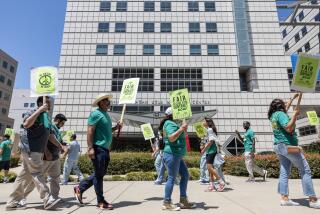USC faculty moves ahead with union election plan, despite warning of increased hostility
USC’s adjunct and part-time faculty filed paperwork Tuesday to hold union elections, a move that supporters say will lead to improved working conditions but administrators have warned could lead to less collegiality on campus.
The non-tenure track professors were organized by Service Employees International Union Local 721, which represents bargaining units at Los Angeles County and city.
There are nearly 6,600 faculty at USC and nearly 5,000 are on a non-tenure track, according to the university’s website. Tenured professors enjoy greater job protections and higher pay than their peers.
If the USC faculty’s petition is approved by the National Labor Relations Board, an election is expected to be held early next year. And if a majority of the eligible professors vote for unionization, the first contract talks could follow soon thereafter.
The petition drive for the USC election comes as adjunct faculty at colleges and universities, including Mills College and California College of the Arts in Oakland, San Francisco Art Institute and Laguna College of Art and Design, have formed unions recently. Adjuncts at Whittier College negotiated a pay raise and a professional development fund in their first union contract this year. However, at the California Institute of the Arts, a unionization effort stalled this year.
Part-time and untenured faculty at many public universities, including the University of California and California State University, long have been represented by unions.
USC faculty who support the move say it could lead to better working conditions, including more job stability and higher pay. A faculty survey conducted by the union this year found that part-time faculty earned on average about $5,000 per course.
Kate Levin, a part-time lecturer in the writing program, said she makes about $8,000 for each of the four classes she teaches each year. “Many of us have a hard time doing the work we love but also making ends meet,” she said.
Levin and others also pointed to cuts USC administrators have made to various benefits, including a university subsidyhttp://netblogpro.com/local/california/la-me-california-commute-20151013-story.html for transit passes, as reasons for employees to organize, especially since tuition has increased over the last several years.
Tuition for this academic year is nearly $49,000.
“I have questions about where [the increase] is going and what it says about the university’s priorities if it’s not going to the classroom,” Levin said.
Many non-tenure track professors at USC have to teach at other colleges as well to make a living, said Alexis Disselkoen, a part-time faculty member at the Roski School of Art and Design.
“Parents are getting upset that they’re finding out students are being taught by part-time professors,” she said.
USC Provost Michael W. Quick said in a statement Tuesday that adjunct faculty have done better at USC than at many of the unionized campuses.
“Our faculty have found that shared governance works. Working directly with faculty, we have achieved real successes — full benefits at 50% time, higher salaries than the SEIU has negotiated at almost every school they have unionized, and enhanced job security by permitting multi-year contracts,” he said.
In a letter to faculty earlier this year, Quick said he thought a faculty union would be detrimental to USC’s atmosphere.
“A big concern of mine is that our collegial processes would be eclipsed by an industrial model of labor relations: an adversarial model,” Quick wrote.
In the letter, Quick also advised faculty members to “read anything an organizer asks you to sign, as you would read any legal document.”
Disselkoen said she found such advice offensive. “I almost feel like they’re insulting my intelligence,” she said.
Recently, non-tenure track professors have begun meeting more with USC administrators, participating in academic committees and even receiving some raises, Disselkoen said.
“A lot of things have been happening, but that can be taken away from us at any moment,” Disselkoen said. “It’s not having a real voice.”
Follow @byjsong on Twitter.
ALSO
Cal State faculty approve strike in salary dispute
USC student uses campus safety app to report Uber driver behavior
California schools are suspending students less, but there’s still a racial gap
More to Read
Sign up for Essential California
The most important California stories and recommendations in your inbox every morning.
You may occasionally receive promotional content from the Los Angeles Times.











